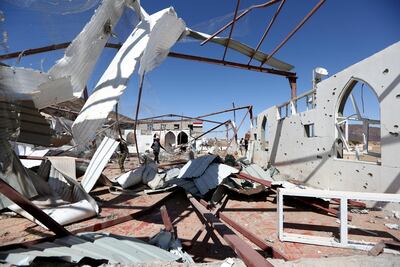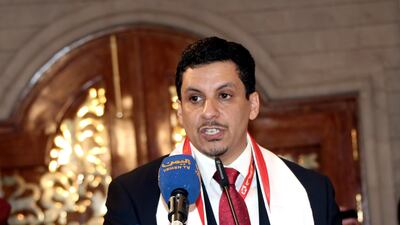Yemen’s government wants to resume direct peace talks with Iranian-backed Houthi rebels to end a brutal five-year conflict, but getting the insurgents back to the negotiating table will require both military pressure and international diplomacy, the nation’s US envoy said.
“We want peace and want to end this war,” Ambassador Ahmed Bin Mubarak said. “Ending the war for us doesn’t mean just stopping the air strikes. The Houthis, when they ensure there is no military pressure on them, will never come to the table.”
The ambassador's comments in an interview to Bloomberg came as Yemen’s conflict risks escalating even further after five years of fighting that’s created what the United Nations has called the world’s worst humanitarian disaster. A UN-commissioned report in April said the conflict, including side effects such as disease, will have killed about 233,000 people by the end of last month. That is about 0.8 per cent of the country’s population.
The UN envoy to Yemen, Martin Griffiths, arrived in the rebel-held capital Sanaa on Thursday in a bid to stop an escalation in clashes between the rebels and government forces in Nihm district, north-east of the city. He called on the parties involved to take all necessary measures to de-escalate clashes that have reportedly killed dozens.
An attack on a military base in Marib killed more than 100 government soldiers earlier this month. The government blamed the Houthis, who denied they were behind the strikes by missiles and drones.

A Saudi-led coalition intervened in the conflict in March 2015, months after the rebels seized Sanaa, in an effort to roll back gains being made by the Iranian-backed Houthi rebels. The rebels were sweeping south through and threatening to seize control of the country from the government of President Abdrabu Mansur Hadi.
Halting the Houthi advance would have been impossible otherwise, said Mr Mubarak . “Without Saudi support and air strikes, the Houthis and Iran would control the entire of Yemen,” he said.
The coalition forced the Houthis out of much of the territory in the south and east but failed to push the rebels from Sanaa, territory along the Saudi border and the Red Sea city of Hodeidah.
Mr Mubarak said Yemeni officials did not want the war to morph into an even broader international conflict. “We hope that we will keep the international voices unified on Yemen,” he said. “Let’s let them fight in Syria, Libya, but let them put all their efforts together and make some success in Yemen.”
While the US provides military support to Saudi Arabia and has targeted extremist militants fighting for Al Qaeda and ISIS in Yemen, it has avoided getting dragged directly into the conflict on the side of Saudi-led coalition and the Yemeni government. It has helped the government by imposing crippling sanctions on Iran, Mr Mubarak said.
The pressure will “have an impact on the Yemeni situation” by limiting Iran’s ability to fund the Houthis, Mr Mubarak said. “The administration is sending the right messages, strong messages, which we do appreciate. We think this is very helpful.”
Efforts to end the country’s conflict have been complicated by tension between the internationally recognised government and separatists in the south.
The UAE told the Yemeni government in June that it planned to unwind its military role in the country by the end of last year. Mr Mubarak said the Saudis sent troops into the south as the UAE forces left and “put all their weight” on this situation.
“Weakening the legitimate government in Yemen, and its institutions, will prolong the conflict,” he said.
The war has allowed a resurgence by Al Qaeda and ISIS in the security vacuum in some areas of the country. It is also causing splits along sectarian lines that did not exist in Yemen before the war, one being abetted by Houthi religious indoctrination of Yemeni youth, Mr Mubarak said.
“This is what concerns me more than the destruction of the infrastructure or the war,” he said. “What concerns me more is the social fabric of Yemen. The cracks – this is something that will stay for decades.”

